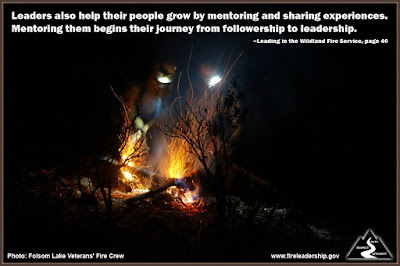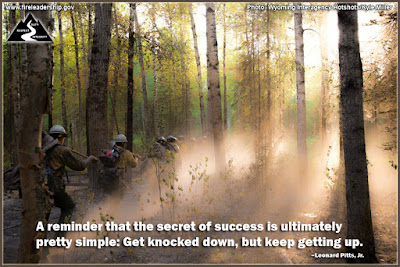A forum where students of fire and leadership come together to discuss, debate and exchange leadership development concepts, experience, and thoughts with an intent to promote cultural change in the workforce and strengthen the wildland fire service and the communities they serve.
Tuesday, May 31, 2016
Sharon Allen-Brick’s Strategic Five-year Plan for Leading a Program
On today's blog Sharon Allen-Brick, USFS Assistant Director, Workforce Development and Fire Training, shares a 5-year program management model she learned during a 1985 Professor of Women’s Studies “Women in Fire” conference at Portland State University and adapted to lead her programs.
Thank you, Sharon, for sharing your knowledge with us.
Monday, May 30, 2016
Honoring Our Fallen This Memorial Day
Thank you to all those who paid the ultimate sacrifice for this great country of ours. Thank you for your service. May your loss not have been in vain.
A shoutout to all those staffing the firelines and serving in support this holiday. We appreciate you!
Friday, May 27, 2016
Assessing Risk Never Stops
[This article is a joint effort between Firehouse magazine and the Wildland Fire Leadership Development Program to promote firefighter health and wellness. We hope all firefighters, regardless of volunteer, structure or wildland, will glean something valuable.]
The concept of risk permeates the fire service. We talk about risk/benefit analysis. Our “golden rule”—risk a lot to save a lot, risk little to save little, risk nothing to save nothing—is ingrained into us in the academy. (We could get into a debate about whether this rule serves us well— if a call is dispatched for a house fire with a report of people trapped, does that mean it’s OK to “risk a lot” by driving faster or not wearing a seatbelt? But that’s another article all together.) We are conscious that on every call, we put ourselves at risk, and we do it because we took an oath to serve the people.
Although risk affects every firefighter at every level, managing risk is one of the key challenges for fire service leaders. Successful fire service leaders take steps to identify and mitigate risks—for themselves, for their crews and, of course, for the people they serve.
 |
| (Photo credit: Cornstock Images) |
Although risk affects every firefighter at every level, managing risk is one of the key challenges for fire service leaders. Successful fire service leaders take steps to identify and mitigate risks—for themselves, for their crews and, of course, for the people they serve.
Thursday, May 26, 2016
IGNITE: Communication is Key
Leaders are cognizant of the central role that communication plays in the ability to lead and always strive to become better communicators. – Leading in the Wildland Fire Service, page 22Do your part and share throughout your sphere of influence!
#fireleadership #fireminis
http://www.fireleadership.gov/
Tuesday, May 24, 2016
How Firefighters Can Manage Stress
[This article is a joint effort between Firehouse magazine and the Wildland Fire Leadership Development Program to promote firefighter health and wellness. We hope all firefighters, regardless of volunteer, structure or wildland, will glean something valuable.]
Firefighting is cited as one of the most stressful occupations. Indeed, occupational stress is inherent to this job. However, the long-term effects of unmanaged stress can have detrimental effects on firefighters’ health. Stress can negatively affect the mind, body, mood and behavior. The human body was designed to respond to stress, but not made to have a continuously aroused stress response. Chronic stress that’s left unchecked can contribute to mental health problems, such as anxiety and depression, as well as physical health problems, such as high blood pressure and a weakened immune system. Chronic stress has also been shown to lead to job dissatisfaction and subsequent burnout. If firefighters are able to recognize common symptoms of stress within themselves, then they will be able to better combat the negative effects.
Monday, May 23, 2016
IGNITE: Leadership is an Art
People under the influence of an empowering person are like paper in the hands of a great artist. No matter what they're made of, they can become treasures. – John MaxwellDo your part and share throughout your sphere of influence!
#fireleadership #fireminis
http://www.fireleadership.gov/
Friday, May 20, 2016
YES TO THE MESS - Surprising Leadership Lessons from Jazz
- WHY READ YES TO THE MESS? -
“How do organizations thrive in a drastically changing world predicated on uncertainty? By building a capacity to experiment, learn, and innovate – in short, by engaging in strategic, engaged improvisation.”
“‘Everyone,’ (Mike) Tyson once said, ‘has a plan until they get punched in the mouth.’ This book is about building a mind-set for our complex, fast-moving world in which even the best laid plans are likely, figuratively, and sometimes literally to get punched in the mouth.”
Yes to the Mess is a book about leading well in dynamic, complex environments, where conditions are frequently changing, chaos and confusion are common, and innovation in the face of adversity is needed. At its core, it’s about how leaders and followers can adapt and find success when things get “messy,” when plans fall apart and leaders are confronted with new or unfamiliar obstacles and challenges. Using his experience as a jazz musician, as well as examples from other areas of business and industry, the author shows that adaptability and innovation in groups is critical to success. While the examples in the book are primarily from the business world, the ideas and concepts apply well to wildland fire organizations.
Thursday, May 19, 2016
IGNITE: Bigger Than Self
Labels:
Compassion,
Food for Thought,
Healthy Conflict,
Humility,
IGNITE
Tuesday, May 17, 2016
A Look at the 2016 Professional Reading Program
Fire leaders are committed to building a high level of competence in team members. Their satisfaction depends on it as does the future of the organization. Some of today's team members are the leaders of tomorrow; it is the leader's responsibility to mentor and help them cultivate the right tools and skills that they will need to face the challenges of the future.(Leading in the Wildland Fire Service, p. 40.)
One of those tools is the Professional Reading Program. Justin Vernon has created a discussion guide for each of the showcased books for 2016.
Monday, May 16, 2016
IGNITE: Keep Getting Up!
A reminder that the secret of success is ultimately pretty simple: Get knocked down, but keep getting up. – Leonard Pitts, Jr.
Thursday, May 12, 2016
Redaction - The Missing Common Denominator
Written by Rowdy Muir
“Redaction”
The Missing Common Denominator
Written by Rowdy
Muir
The purpose of a “Blog” is to get
a discussion going. This article certain received a lot of attention. I want to
thank all the many positive comments. Thanks to Chuck Maxwell with helping with
proper language.
However, as a leader I need to own
my mistake in misrepresenting some of the language.
First, the numbers were to reflect fatalities and
entrapment fires not that if you were in these categories that you had an 80% chance of death.
Second, the numbers were to
reflect all firefighters not just wildland firefighters.
So with that being said, here is
the redacted version of the article. Again, please except my apologies.
IGNITE: INFLUENCE
Leadership is about influencing others to accomplish tasks that are in the best interest of our organization; this often means influencing those above us and leading up. – Leading in the Wildland Fire Service, page 48
Monday, May 9, 2016
IGNITE: Consequences Express Compassion
Consequences express compassion, when delivered with a person’s best interest in mind. – Dan Rockwell
Thursday, May 5, 2016
IGNITE - The Role of the Follower
Labels:
Communication,
Competencies,
Followership,
Food for Thought,
IGNITE
Tuesday, May 3, 2016
Breaking the Mold
 |
| (Photo credit: Leonard McLane) |
Monday, May 2, 2016
Subscribe to:
Posts (Atom)












